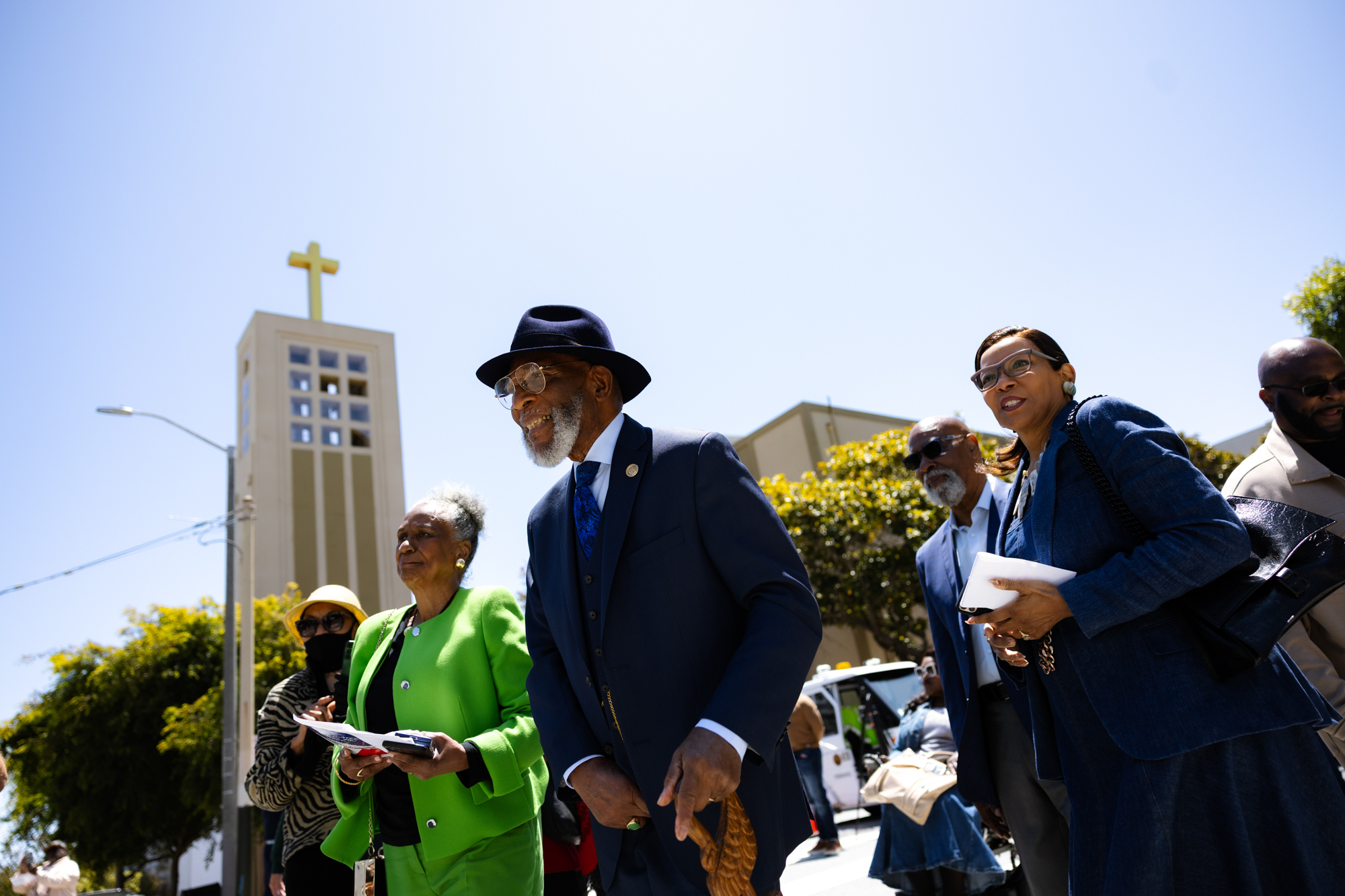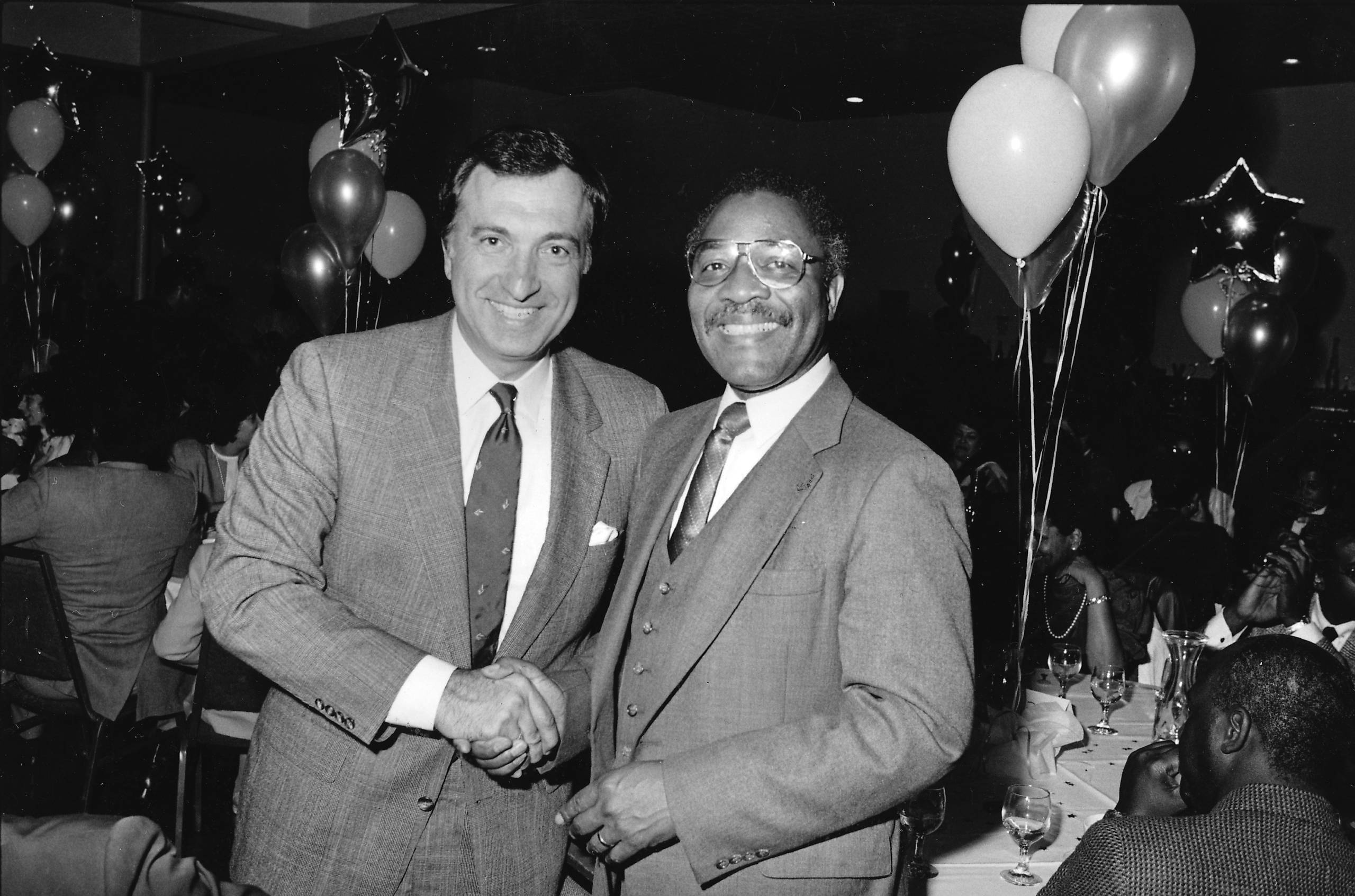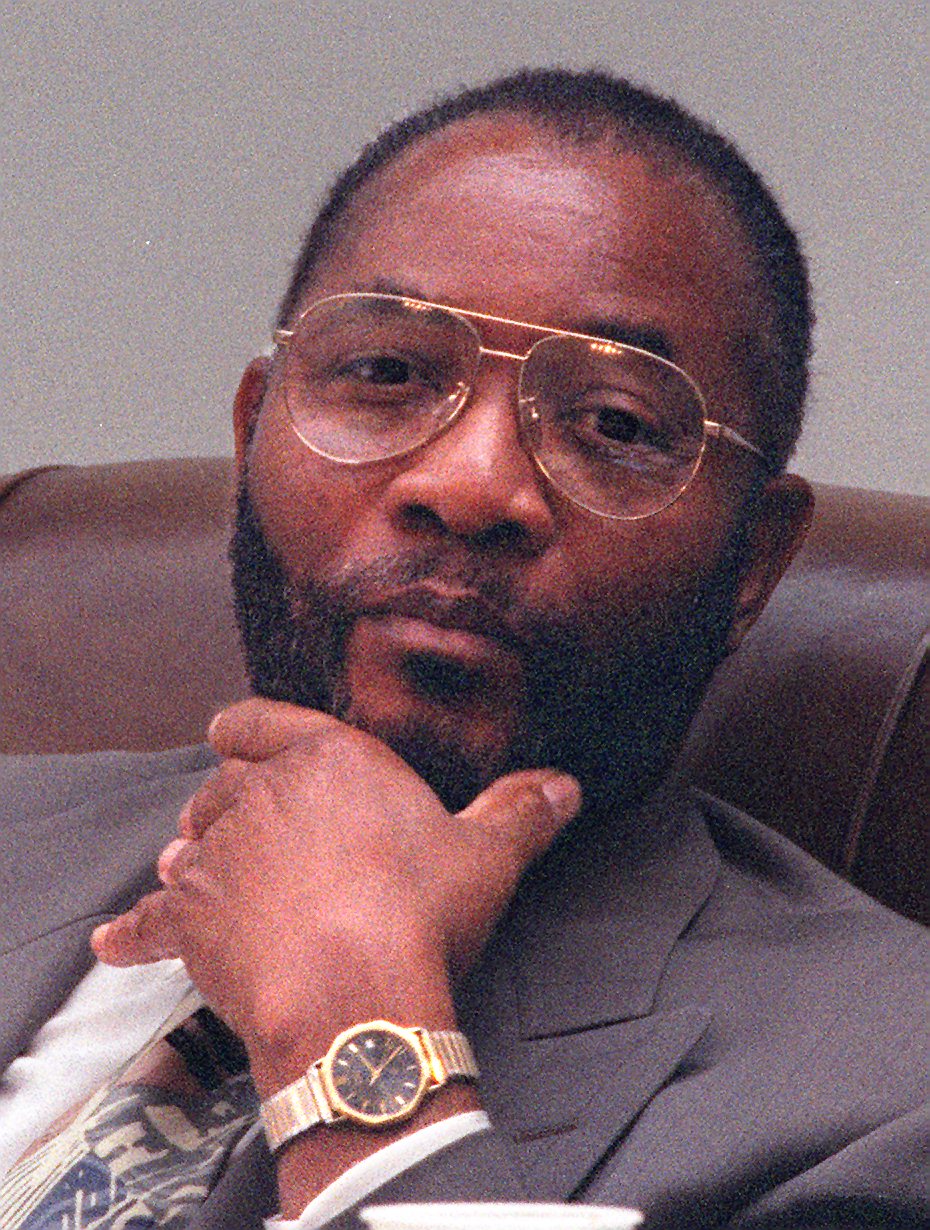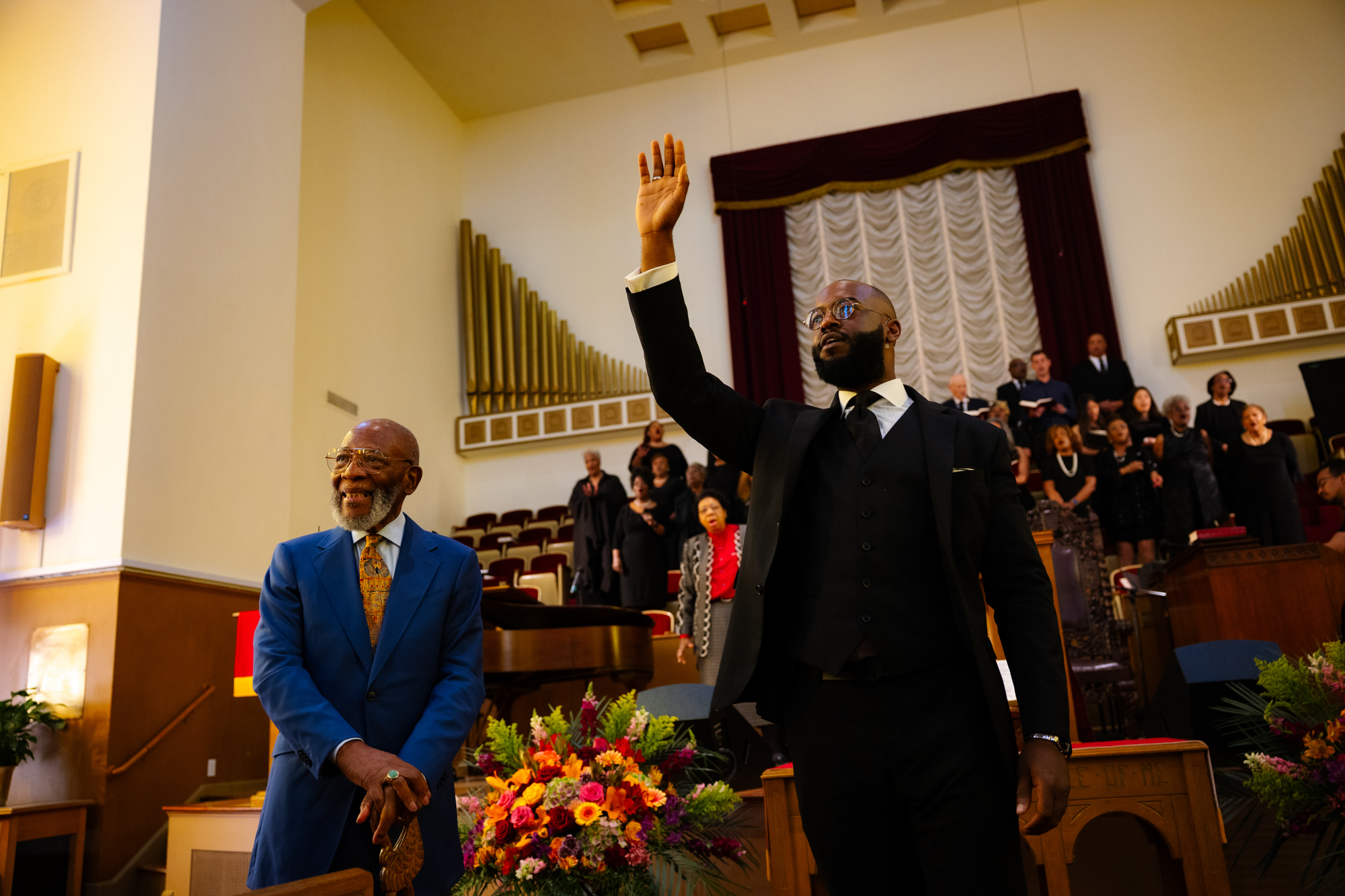Brown hasn’t just preached to San Francisco’s Black community; he has taught, inspired, baptized, eulogized and fought for them in boardrooms where they couldn’t get a seat.
Among those honored alongside Brown on June 3 was former Police Chief Bill Scott, recognized for his decades of public service. When Scott took the podium, he became emotional and acknowledged Brown first, his voice breaking as he spoke about the person who has been “a straight-up champion, in San Francisco and beyond.”
“This community owes him a debt of gratitude. I owe him a debt of gratitude,” Scott said. “As an African American man, I’m so proud of that. When I listen to him, and I’ve heard him preach many times, it always brings everybody into the conversation. He wants what’s best for everybody.”
Former Assistant Chief David Lazar recalled Brown’s hands-on approach. Twenty-six years ago, when Lazar was a vice officer dealing with prostitution problems in the Mission, Brown — then a member of the Board of Supervisors — insisted on seeing the situation for himself.
“He got in the car with me. That was the first time I met him. We went around and looked at everything,” Lazar recalled. “That’s a perfect example of someone on the ground. Here he was, in city government, but he came out to the community to see what was happening.”

That personal approach defined Brown’s ministry. Former Mayor London Breed recalled how during the height of gun violence in the city, “time and again, young Black men were being killed. Families had no place to bury their sons.”
Brown never hesitated. “Every single time a call was made to Rev. Brown, he said, ‘Yes.’ Every time,” Breed said. “He wasn’t seeking recognition. Most of the time, he didn’t even want people to know what he had done.”
When San Francisco Mayor Daniel Lurie stood alongside Brown on the steps of City Hall on June 12, joined by other faith leaders and community groups, he reaffirmed the city’s commitment to remaining a sanctuary amid a wave of immigration raids and detentions that have sparked protests across California.
The Board of Supervisors unanimously passed the street renaming. Jonathan Butler, the current president of the San Francisco NAACP, said the street renaming is “a legacy carved in concrete.”
“It’s an opportunity to teach our students in San Francisco about civil rights and the people who fought for it right here in this city,” he added.
At the June 21 unveiling of the Dr. Amos C. Brown Way street sign, Breed spoke about the impact of Brown’s service.
“There are even more people who don’t even realize that because of him they are who they are,” she said. “I’m one of those people.”

A sanctuary in the city
The doors of Third Baptist swing open for everyone.
Faith is welcome but not required. Your skin color doesn’t matter. Your zip code is irrelevant. What matters is that you come with reverence — for the history held in these walls, the culture that pulses through this community and the movement still unfolding in a space where civil rights and spiritual purpose have always been one.
Brown was mentored by Medgar Evers, the NAACP’s field secretary for Mississippi who was murdered at his home in 1963. Inspired by Evers, a World War II veteran and civil rights activist, Brown founded the NAACP’s first youth council in Jackson, Mississippi.
Brown, whose great-grandfather was born enslaved, is one of eight students to take the only college class ever taught by Dr. Martin Luther King Jr. at Morehouse College.
After taking over Third Baptist in June 1976, Brown transformed the church into a hub for activism, interfaith coalition-building and empowerment.

He served on the San Francisco Board of Supervisors from 1996 to 2001, first appointed by former Mayor Willie Brown Jr., then elected to the role. As president of the San Francisco NAACP, he led campaigns against police misconduct and government discrimination, pushing for equity in education, housing, public safety and healthcare.
“In my efforts to be concerned about the rights of Black people, I didn’t stop with just Black people,” he told me in a recent interview. “I’ve always been committed to equal protection under the law for LGBTQ+ people, for Asians, for Latinos and for immigrants, especially those from Africa and the Caribbean. Our activism must be rooted in justice for all.”
The Fillmore, a district once dubbed the Harlem of the West, is where his legacy is most deeply felt. He was one of the earliest and most vocal critics of the urban renewal programs that displaced thousands of Black families during the 1960s and ‘70s.
“San Francisco has often looked at Black folks, but hasn’t truly seen us as worthy of having our watering hole, our gathering place, where we would be able to thrive and survive in this city,” Brown told me.
Brown, who served on the California Reparations Task Force, the first statewide body to study and recommend reparative measures for Black people who suffered racial harm, continues advocating for spaces where the community can gather, celebrate culture and access resources denied by racist policies.
As former Vice President Kamala Harris — whose ascension to highest levels of government began in Oakland and San Francisco — launched her presidential campaign last July, conservative media personalities assailed her position on reparations as extremist and zeroed in on her relationship with Brown.
Brown, who led the closing prayer at the Democratic National Convention on the night Harris accepted the nomination, said those who used reparations to attack Harris were misguided.
“They don’t know history,” Brown told KQED. “Anybody who just cancels out and says no, they don’t respect the humanity of Black people, and they have a deep, deep problem. For we are human, and we deserve the same thing that other human beings have received in terms of repair for harms done.
“That’s what reparations is all about, repairing the harm that was done to an individual, to a people, to a situation.”

In retirement, Brown told me he’s working on a book chronicling his journey through faith, civil rights and public service.
“Retirement doesn’t mean I’m going to sit in a rocking chair and twiddle my thumbs,” he said. “I’ve always been an activist. I’ll just be working from a different corner of God’s Earth so to speak.”
He’ll continue mentoring the next generation, including Crawford. “He’s got common sense, what we call motherwit. And he’s got empathy,” Brown said.
As San Francisco etches his name into concrete and memory, something deeper is happening.
This isn’t just about honoring the past — it’s about inheritance, the kind rooted in Sunday morning wisdom and weekday action, and in the understanding that some paths are meant to be walked together.
A street now bears Brown’s name, but the true monument lies in the choice to keep walking, to keep showing up, to keep returning to the places that shaped us — and continue the work that defines us.
And yes, I’ve been going to church — arriving right on time, communion wafer intact.
Meaghan Mitchell is a San Francisco native and narrative journalist whose first-person reporting is deeply rooted in the communities she covers. An early employee of The San Francisco Standard and former editor at Hoodline, her work has appeared in SFGATE, San Francisco Bay View and SFist, among other outlets. She focuses on arts, entertainment and community stories in underrepresented neighborhoods, centering her work on engagement, cultural events and social equity — and amplifying the resilience of San Francisco’s diverse communities.


1 Comment
t7f1p2